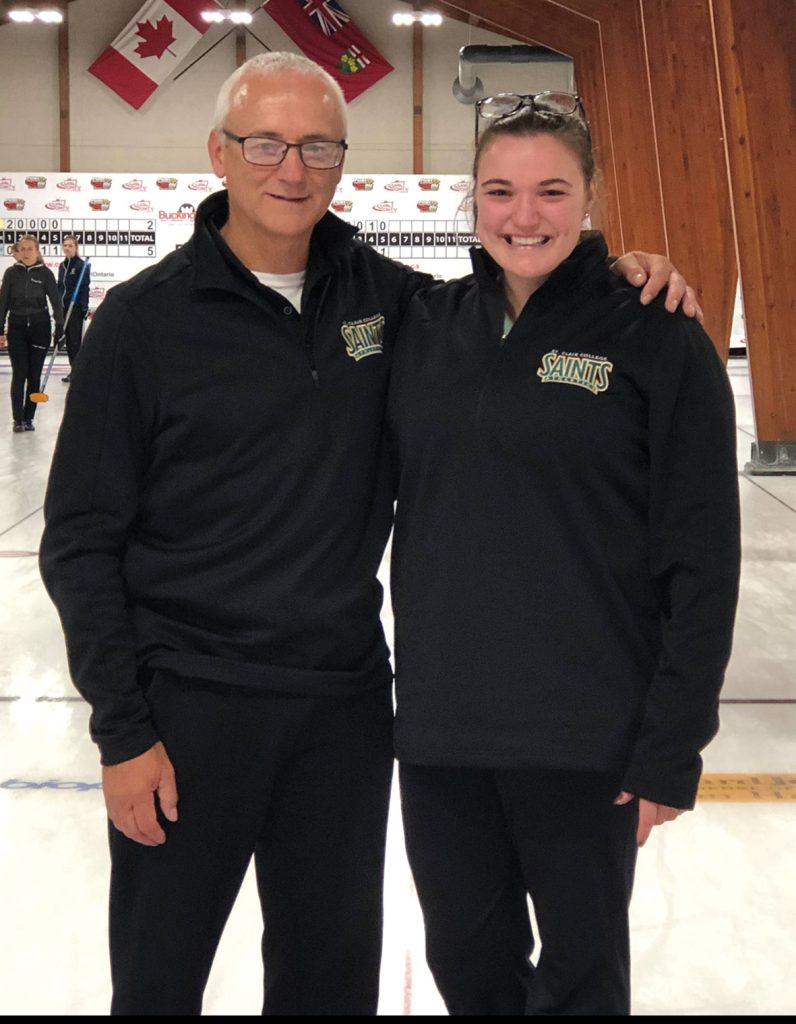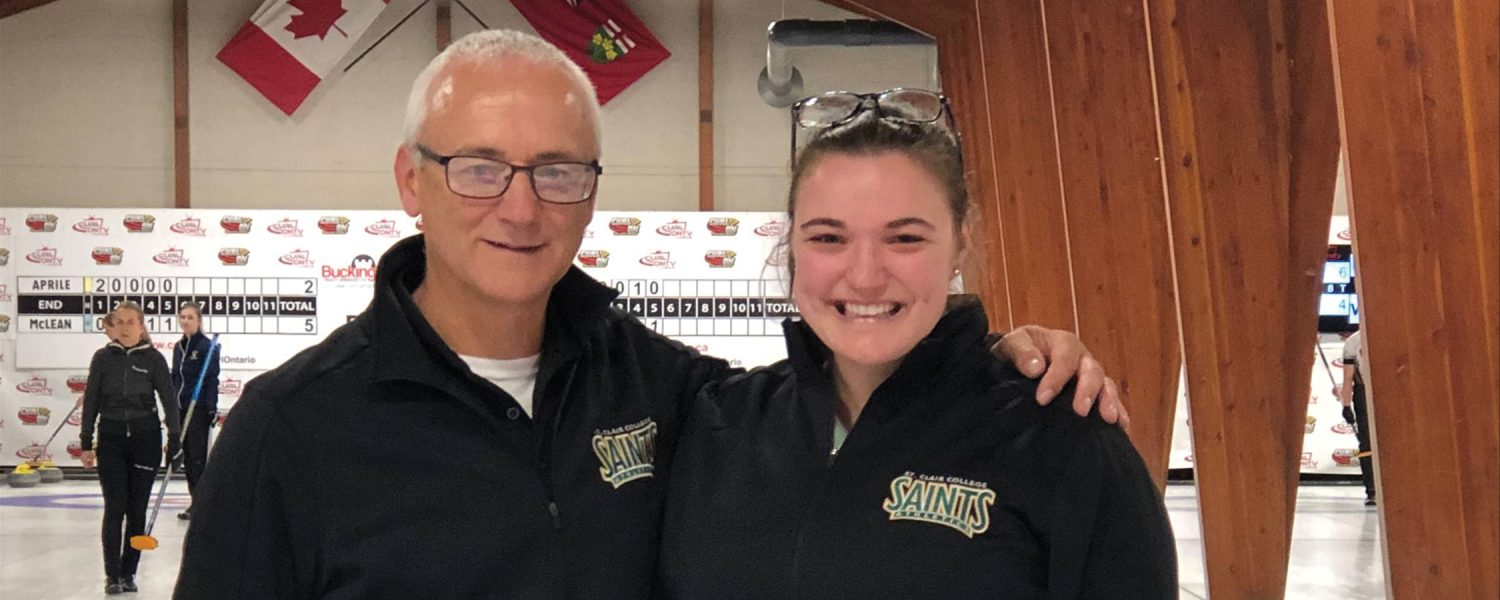Father-Daughter Duo Plays at Elite Levels
Story by Ron Stang
Photography by Charlene Haluk-McMahon
It was another kind of dream on ice when father-daughter Phil Daniel and Laura Beneteau teamed up during the recent Ontario Mixed Provincial Curling Championship. The event, held at Beach Grove Golf and Country Club, was the realization of a long-sought desire by the St. Clair Beach family members to play together in a major competitive event.
Curling has been in the Daniel family, well, for pretty much forever. Phil’s parents played this, Canada’s other winter sport and Phil got bitten by the curling bug as a teen. It all started in 1965 when Beach Grove—celebrating its 100th club birthday this year—added a curling rink. “From there everybody in our family gained interest in the sport,” Phil says.
Phil, 58, who worked in IT at Hiram walker and Valiant TMS and is now retired, starting when he was eight and qualified for various Ontario junior men’s championships. He played at the University of Windsor. He has curled competitively for many years from juniors through seniors (50+).
Laura, 27, started at Beach Grove in the juniors’ program at age 5. She began curling competitively from age 13 until university and played in various Ontario championships. In 2011, Laura’s Bantam Mixed team won the Ontario Championship, with Phil as her coach. Laura, now living in Mississauga, is a civil engineer with Canadian construction giant EllisDon, currently working on renovations to Toronto’s St. Michael’s Hospital.
In fact, not just Laura but Laura’s three sisters all played the game. But Laura was
the one who extended her career most competitively.
What’s fascinating is how Laura picked up the sport, almost by osmosis. Phil’s wife Wendy would take the family to Phil’s competitive tournaments. Laura attended her first Ontario Mixed Curling Championship in 1994, in Smiths Falls, when she was three months old.
One day during the Ontario Mixed Curling Championship in Whitby in 2003, one of his competitors was playing with his two daughters. Laura, just nine years old, watched and said, “I want to do that one day with my dad.”
The next year Phil’s team won the Ontario Mixed Curling Championship and went to the nationals in Prince Albert, SK. “And so again interest grew,” Phil says. Competitive teams at this level can be made up of members from throughout the province. Finally, this October, playing in his fourth Ontario Mixed at Beach Grove, Laura joined him. “So, we were able to realize Laura’s dream and we got to play together at a provincial championship,” he says.

When Laura started playing at age five it was under the guidance of her dad. “They wanted dad to coach, and he would only coach if they let him bring me out on the ice with him,” she says. She curled in junior’s locally and then began curling outside the club and got more involved competitively, from age 13 until university. But after university, where she got her engineering degree and an MBA, curling “took a bit of a backseat.”
Phil’s curling career originally took off when he qualified for the first time for the Ontario (Men’s) Provincial Curling Championships in 1988. The event is important for its level of play and Championships take place in OHL arenas. His first was in Peterborough where his team lost the final to Wayne Middaugh, who went on to win the world championship that year. Phil qualified again in 1999 and made it all the way to the championship final before losing to Richard “Rich” Moffat of Ottawa, another big name in Ontario curling. Phil’s team didn’t qualify in the intervening years but did in 2002 and lost the final to John Morris, two-time Olympic gold medalist. Future competitions continued with Phil’s team playing at a high level against the likes of Mike Harris, who skipped (captained) Canada’s Olympic team in the late 1990s.
What is it about curling that’s so intrigued Laura and Phil?
“Curling looks easy on TV but making a curling shot is really hard,” Laura says. The object of the sport, of course, is for players to slide a 40-pound polished granite “stone” along a sheet of ice to the “house” or target. “Simplified, you just need the right weight and the right line,” Laura says. “But the number of factors that go into what the right line and the right weight are, is tremendous.” Especially under pressure and you make a great shot, “there’s no better feeling.”
Phil calls the sport “a very mental game.” It’s often called “chess on ice” as teams try to outplay opponents by best positioning the stones or knocking the opponents’ out. Phil plays skip or captain of the four-member team. “Half the fun for me as a skip is trying to outwit the other skip,” he says. “You want them to be chasing you, you want to be dictating the pace of the game as opposed to chasing the other team. If you can get the other guy chasing you, you’re already ahead of the game.”
Curling has traditionally been more popular elsewhere in Canada than in Windsor, perhaps because of our very atypically Canadian milder winter climate. And popularity in the sport is waning. Only three local clubs are left—Beach Grove, Roseland and Leamington. And there is concern Roseland may eliminate its rink under major renovations.
Laura says there are fewer teens entering the sport. Perhaps it’s because of more entertainment and personal options. And those who do play tend to drop out when pursuing post-secondary education and careers.
Both Phil and Laura agree that something has been lost in efforts to professionalize the sport in tandem with giving it Olympic status. Says Phil, “More funding is going into it for training for the elite athletes and the rest of us have careers and jobs and families that we could not just dedicate the time to.”
The days may be gone when “four guys from Essex County” could be good enough to “beat a world champion twice in one day” such as his team did to two-time world champion Russ Howard in 1998.
“But that’s the way the sport was at that time,” he adds. “You had that chance. You always had that chance that you could win that one game.”




Add comment